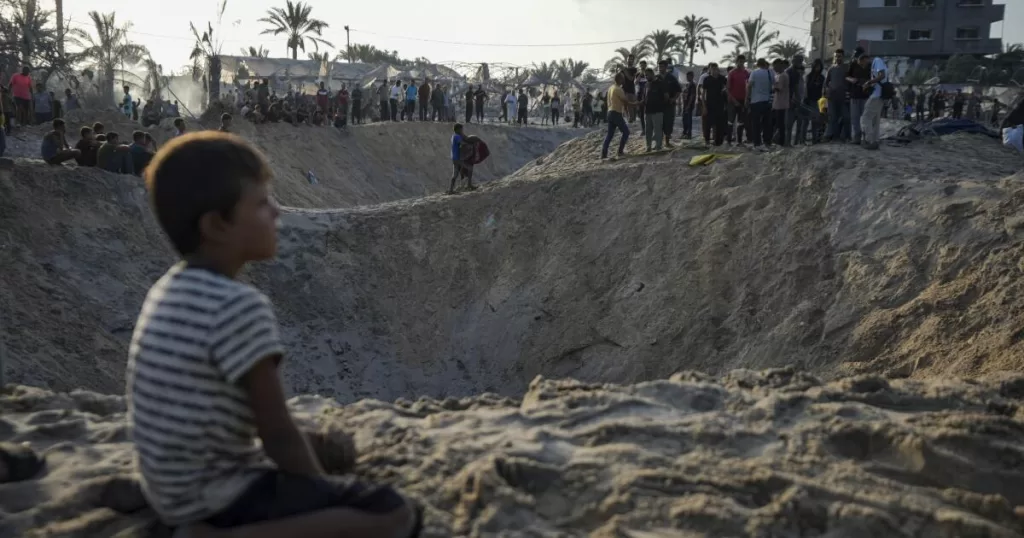As the world prepares to mark the first anniversary of Hamas’ Oct. 7 terrorist attack and the ensuing war is set to drag into a second year with intense fighting on another front, many Americans are wondering why President Biden has been unable to end the conflict.
Contrary to plenty of commentary, it certainly has not been for lack of trying.
Since the war broke out, Biden has visited Israel and had a host of conversations with Israeli Prime Minister Benjamin Netanyahu. Secretary of State Antony J. Blinken has made at least 10 trips to Israel. Secretary of Defense Lloyd J. Austin III has also made multiple visits to the country since Oct. 7 and had seemingly countless talks with his counterpart, Israeli Defense Minister Yoav Gallant. This is all on top of lower-ranking U.S. officials’ continuous efforts to engage with Israel.
And yet for all the time and effort the Biden administration has expended, it has failed to broker a cease-fire between Israel and the militant group Hamas. Meanwhile, the threat of a wider war loomed again this week as Iran launched a missile attack on Israel in retaltion for the escalation of its conflict with the Iran-backed militant group Hezbollah in Lebanon.
The Biden administration is hardly alone in its struggle to find diplomatic common ground in the Middle East. Ever since the Oslo accords some three decades ago, a series of American administrations have tried and failed to broker peace between Israelis and Palestinians.
At the same time, although Americans may want wars to be short and relatively restrained, they rarely are. The unfortunate battlefield reality is that any war against a group such as Hamas — with its estimated 30,000 fighters and hundreds of miles of tunnels embedded in one of the most densely populated places on Earth — was going to be a long, bloody slog. There is very little that anyone — even an American president — can do to change that.
Biden’s critics counter that the administration could put more pressure on Netanyahu to force a cease-fire. They note that Israel receives billions of dollars’ worth of American military aid and depends on American diplomatic cover. They say that provides sufficient leverage to force Netanyahu’s hand. But does it?
In practice, the United States often has less influence over its allies than one might think. Historically, economic sanctions have a poor track record of forcing major concessions, particularly when existential security matters are at stake — which, in Israel’s case, they are. Indeed, threats to sanction the hard-right elements of Netanyahu’s coalition have yet to produce any sort of moderation. At the same time, the International Criminal Court’s announcement that it would seek arrest warrants for Netanyahu and Gallant produced what few other policies could: It united Israel’s fractured political spectrum around the current government.
Even if U.S. pressure were effective enough to motivate the Netanyahu government to try to end the war, it still might not succeed. Ending the war, after all, would require the cooperation of both Israel and Hamas — and more specifically Hamas leader Yahya Sinwar, who shows no signs of budging.
Sinwar could unilaterally declare a cease-fire, release all the remaining Israeli hostages and deny Israel one of its core justifications for the war. But Hamas seems intent on executing hostages and otherwise doubling down on the hostilities. Presumably, despite all the devastation and suffering in Gaza, Sinwar on some level still believes that he is winning.
Even if America had successfully secured a bilateral cease-fire, it would be unlikely to produce a lasting peace. Indeed, all the structural and political reasons that have prevented peace for decades remain.
Because Israel would have to free hundreds of militants serving life sentences for murder in exchange for the release of remaining hostages, Hamas’ ranks would swell during a cease-fire. Eventually the battered organization would rebuild and strike again. Moreover, regional spoilers — most notably Iran — view a continuing proxy conflict with Israel as being in their strategic interest.
A year in, the Biden administration’s diplomatic offensive has yielded some modest results. The rate of casualties — even as reported by Gaza’s Hamas-controlled Health Ministry — has slowed. Aid to Gaza’s civilians, albeit insufficient, is flowing. More than three-fifths of the hostages taken on Oct. 7 have either been freed or recovered, although 97 have not. And, most important, a full-blown, regional Middle East war — widely feared at several junctures over the last year — has been averted, at least for the moment.
All that is admittedly cold comfort to the Palestinians caught in the crossfire, the Israeli hostages who remain in Gaza and the growing displaced populations of southern Lebanon and northern Israel.
In the wake of the Iraq and Afghanistan wars, Americans have become far more aware of the bounds of what military power can achieve. But other tools of national power, including diplomacy, have their limits too. Outside mediators can’t end this war, particularly if the combatants themselves don’t want to stop fighting.
Raphael S. Cohen is the director of the strategy and doctrine program at Rand Project Air Force and of the national security program at the Pardee Rand Graduate School.
